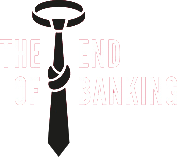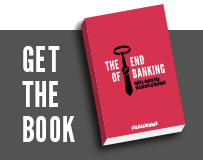The CFA Institute Blog Reviews The End of Banking
Last week, Manuel Stagars from the CFA Institute blog published a review of The End of Banking. The CFA Institute is known for its program to obtain the Chartered Financial Analyst credential, one of the most respected and recognized investment designations in the world. We are delighted that the important discussion about how to adapt our financial system to the digital age is picking up pace, also in the financial community.
Stagars' review starts with a thoughtful and well-written summary of the book, so it is an excellent resource to learn what The End of Banking is about. He concludes that the book "is well researched and is a stimulating, thought-provoking read" and thinks that:
"In addition to carefully explaining how the financial sector maneuvered itself into the financial crisis of 2007–08, it presents several unconventional ideas to do away with regulatory capital arbitrage that sticks taxpayers with the bill for bankers’ risk taking. The book proposes a fairly straightforward policy framework that promises to reduce shadow banking, decentralize financial services from too-big-to-fail banks, improve regulation, and realign the private and the public sector with transparent monetary policy."
At the end of the review, Stagars rightly cautions on the political and economic challenges to transform the current banking system into a financial system without banking. We are the last to deny that the transition might be a rocky road. But there is one statement in his review we need to discuss further:
"While reading this book, I didn’t find a market-driven incentive for established banks to upgrade their business models. The authors recognize that they only put forward a vision without outlining the path. Still, their approach raises the question of why the existing financial sector and monetary authorities should feel the need to restrict themselves."
Of course, banks have no incentive to change the current situation! As we explain in Chapter 9, unconstrained banking remains a very attractive business model in the digital age, despite its negative effects on the economy. It is such an attractive business model that even peer-to-peer lenders start to discover it.
In a way, the statement above is as if you say that the analysis of a monopoly by a competition authority is correct and insightful. But while reading the report, you couldn't find any market-driven incentive for the established monopolist to change its business model. Of course, the monopolist will never adapt freely, as it is only society who has an interest that the competition authority enforces its decisions.
The End of Banking shows how the definition of solvency has to be adapted to the digital age. To update the legal rules defining solvency is ultimately a political decision that has to be taken against the interests of the established banking institutions. You cannot expect the institutions who exploit today's flaws in corporate law to renounce their right and to voluntarily upgrade their business model.




